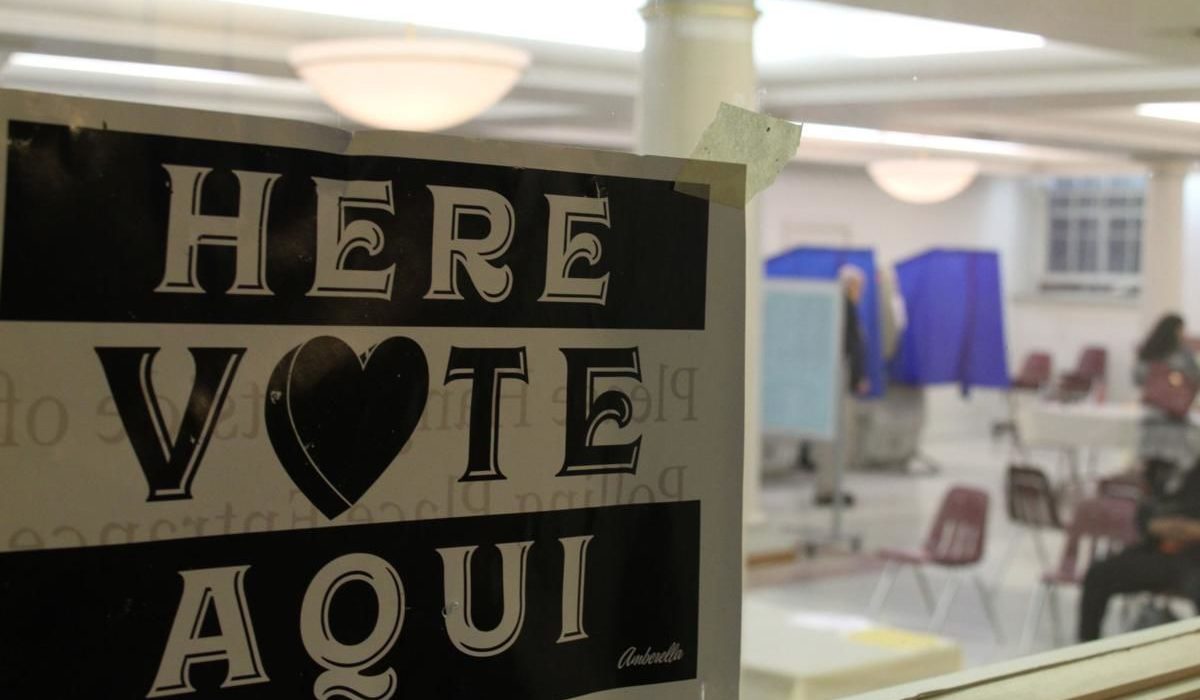The brouhaha over the buying of new voting machines for the city reached a crescendo when 83 of the most expensive and least secure varieties – according to voters’ rights advocates – arrived in Philadelphia last week.
The machines toured by a crew from a local television station before the procurement process had been finalized. That move subsequently has raised lots of eyebrows and questions and now has the whole affair under investigation by City controller’s Rebecca Rhynhart’s office.
City Commissioner Lisa Deeley, who has recused herself from sitting on the commission because she is running for re-election, gave NBC10 a look at the ES&S Express Vote XL machines, which cost about $8,000 each and which advocates from Protect Our Vote Philly Coalition and other groups say are less reliable and less protected against tampering than paper ballot systems with scanners.
“I think they we picked the worst, most expensive, least secure machines, unfortunately,” said Democratic commissioner candidate Jen Devor, who is running in a pool of 12 other Democrats, including Deeley, in the May 21 primary. “From the start of the conversation I’ve been advocating for hand-marked paper ballots with limited ballot marking devices, and I was really disappointed with the decision.”
At a meeting on Feb. 20, commissioners Deeley and Al Schmidt, who is also running for re-election, voted in favor of the large-face, touchscreen, paper-audit machines. Then they immediately recused themselves from the three-member commission. Judges Giovanni Campbell and Vincent Furlong were appointed as interim commissioners. Commissioner Anthony Clark, who is not running for re-election, retains his seat.
Deeley has claimed that accessibility and familiarity were reasons that she selected these machines. But voting-rights advocates say that the process was unnecessarily cloaked in secrecy during a private request for proposal process and that the new machines are more vulnerable and more expensive than preferable hand-marked paper ballot systems available on the market.
Advocates are outraged that Deeley apparently brought in 83 of the ES&S Express Vote XL machines in a furtive manner to show off to the press, questioning her motives and saying she should have nothing to do with the machines at this point since she is running for re-election.
Asked how the 83 machines suddenly appeared, Deeley responded in an email, “On Monday, the department received an advanced shipment of 83 ballot marking devices so that there is a supply for public outreach efforts and for hands-on training programs for the staff and poll workers starting early this summer.”
––
“The delivery of these 83 machines before a contract has been signed or funding approved by City Council shows just how broken this process has been, every step of the way. I’m deeply concerned about the legality of this process, and as City Controller, I will not release $1 of payment while these questions go unanswered.”
– Philadelphia City Controller Rebecca Rhynhart
––
“Nobody authorized this,” said attorney Mark Zecca, who worked for the city for 20 years. “Nobody has authority to be spending any of this money. This hasn’t gone through the controller or through any of the normal approvals. And she’s [Deeley’s] supposed to have hands off entirely.”
At a sunshine meeting last Wednesday, members from Protect Our Vote Philly Coalition urged the commissioners make a motion to halt the procurement process and start over. POV members are also calling for Deeley’s resignation from the commission and from her race for re-election and urging the Philadelphia Board of Ethics and the state Ethics Commission to investigate her actions, saying in a statement that “Commissioner Deeley attempted to obscure the fact that she was already a candidate under state law well before February 20, when both she and Commissioner Al Schmidt voted to approve the purchase of ES&S ExpressVote XL voting machines.
State law provides that commissioners must be removed from the Board of Elections when they become candidates so that they do not handle equipment such as voting machines which could be used to count votes in their own elections or make decisions about the conduct of their own elections. Deeley knowingly voted to approve machines intended to be used in the November election in which she planned to be a candidate pending the outcome of the primary.”
“We have a suggested motion that one of you could make now to stop all this in the interests of protecting the integrity of Philadelphia’s voting system,” said Gloria Gilman of Protect Our Vote Coalition at Wednesday’s meeting. “Would either of you like to make such a motion?”
No one did. But Commissioner Anthony Clark, who is not running for re-election and refused to sign a confidentiality agreement during the request for proposals process, spoke out Wednesday during and after the meeting.
“How the machines came I don’t know,” Clark said, after testimony from those outraged by Deeley’s actions. “Who’s paid for them, I don’t know. All three of us will find out how…we are the board, so no decision should be made without the board knowing what’s going on.”
Following the meeting, Clark’s sentiments were far from over.
“I don’t want to be a part of any secret,” Clark said. “It was said to me that they didn’t tell me [about the machines coming in] because I didn’t sign the confidentiality [agreement]. But yet the press had it. They didn’t sign confidentiality [agreements]. So is that the real reason or is it something else is going on?”
Since Clark refused to sign a confidentiality agreement, he wasn’t part of the selection committee. This was the first time the city used a best value procurement initiative, not binding the city to choose the lowest bidder and allowing the process to be closed to the public.
Councilman Bobby Henon who was recently included in a 116-count federal indictment against union boss John “Johnny Doc” Dougherty, introduced the best value procurement initiative. Deeley is a former Henon aide. According to phillypowerresearch.org, her campaign is heavily supported by the building trades.
Critics claim that the request for proposals was written in such a way that only the ES&S Express Vote XL machines could have been chosen. They are heavy machines, weighing approximately 300 pounds each compared to the current machines, implemented in 2002, that weigh about 100 pounds each. Some critics have said that the new machines will even require a climate-controlled warehouse that the city has not designated at this point.
“Her [Deeley’s] funding comes from unions,” Zecca said. “You have to wonder. You would have to have this new warehouse. They’re [the machines] harder to transport, heavier, bulkier, more sensitive, more prone to break down. So they’re going to keep people busy who work with electrical equipment – who move, install, and repair electrical equipment, a lot more truck drivers – so your operating costs each and every year are going to be a lot more.”
The city has allocated $22 million for the purchase, with new machines being required of all state counties before the presidential election next year. Russian tampering in the 2016 election and worries about voters’ rights has made buying new machines a hot button topic. But $22 million will fall far short of the $50 million to $60 million needed if the city goes through with the purchase of the ES&S Express Vote XL machines.
“We think that this whole process for selecting these voting machines has not been transparent, and there are a lot of problems with it,” said Vicki Miller, leader of Indivisible Philadelphia and part of the Protect Our Vote Coalition. “This is a system that has been proven in other jurisdictions to be unreliable… All the security experts say this is not the most secure system.”
Systems that use hand-marked paper ballots that then go through an optical scanner to be tabulated are preferable partly because they are cheaper and more secure, advocates say. A paper ballot is much harder to tamper with and does not pressure voters to rush since they can go off in a corner and take their time, rather than waiting in line to use a machine, Zecca said.
“They [Deeley and Schmidt] seem like in a hellbent mad rush, and it makes it seem like they’re not in it for interests of the public but for their own reasons,” Zecca said.
After the 83 machines arrived, City Controller Rebecca Rhynhart issued a statement saying, “The delivery of these 83 machines before a contract has been signed or funding approved by City Council shows just how broken this process has been, every step of the way. I’m deeply concerned about the legality of this process, and as City Controller, I will not release $1 of payment while these questions go unanswered.”
“This is highly significant for several reasons,” Zecca wrote in an email to PW in reaction to Rhynhart’s statement. “It indicates that the city administration is fighting the subpoena; that it is obstruction of justice, particularly in this case, at this time, in this Local 98 indictment climate; that the obstruction of the controller’s valid authority under the charter to obtain this information is an independent ground for her to use her charter authority to block funding; that she has a duty to determine the legal authorization of funding before releasing it; that failure to allow her to get the information she needs thwarts her valid inquiry; that the burden is on the administration to show her that the funding is properly authorized through a lawful process. If they fail to do so, she is authorized to block it.”
Asked if she will halt the process, Rhynhart said she essentially had, since she is not releasing any money. Her office has subpoenaed records from the commissioners’ office related to the voting machine selection process.
“There’s too much concern about the legality of the process,” Rhynhart said. “My office has an investigation ongoing.”
To further complicate matters, a Philly.com report just this week revealed that Deeley has been stripped of her notary license for failing to check someone’s identification, which led to the fraudulent denial of a woman’s rights to her husband’s death benefits.
“I think people should call on Lisa to resign,” Zecca said. If she can’t honestly do a notary job with integrity [which is the lowest level license calling for honesty]how can she be trusted with a job calling for much greater integrity such as her elected position? I speculate also that she must have been asked to do this improper notarization by someone powerful to her.”
In response to a request for comment, Deeley told PW via email: “Last year, I voluntarily surrendered my notary commission to resolve a complaint about a lapse in my work as a notary dating back to 2010 – long before holding elected office. I took full responsibility for this lapse. I voluntarily surrendered my commission which is not required to hold my office, to avoid any distraction in my work serving the people of Philadelphia.”
The notary issue aside, others were still calling for Deeley’s resignation based on her behavior during the voting machine procurement process.
“Absolutely she should step down,” Gilman said. “It [bringing in the machines] was totally outside her job and puts the city in jeopardy because we have liability if somebody steals these machines or mars them or whatever, and who gave her permission to do that? And that’s really shocking.”
Schmidt did not respond to requests for comment.
“I personally feel violated,” said South Philly resident Caroline Leopold, after Wednesday’s meeting. “I feel like I can’t trust the election process at all.”
TWITTER: @CHARRISBOND





